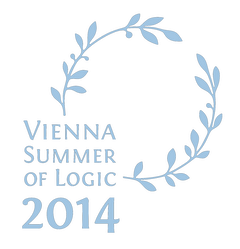Special Journal Issue Call for Papers
We invite submissions of papers on Verification of Engineered, Molecular
Devices and Programs for publication in a special issue of the Journal
of Theoretical Computer Science (TCS), Section C (Theory of Natural
Computing). We especially welcome extended versions of papers presented
at the VEMDP 2014 Workshop in Vienna, affiliated with CAV 2014. We additionally also invite
submissions of papers not presented at VEMDP, provided they fall within
the scope of the call.
Scope
Significant advances have been made recently in engineering of synthetic,
biomolecular systems, such as those built from DNA, RNA or enzymes.
Potential applications are envisaged in biosensing, biomanufacturing and
smart therapeutics, where safety and reliability are paramount. Since
designing such systems is challenging and error-prone, formal modelling
and verification techniques tailored to these types of systems are
called for.
This special issue will be devoted to original research papers on theory
and verification of engineered biological and chemical systems. While
the main focus is on systems that do not occur naturally, we also
encourage submissions concerning the verification of naturally occurring
systems that have been functionally modified. These systems include, but
are not limited to:
-
DNA computing and other forms of natural computing
-
Chemical reaction networks
-
DNA walkers and motors
-
Engineered transcription networks and other synthetic biology
applications
Topics
We will consider papers on any aspect of theory and verification of the
above systems, including:
-
Modelling formalisms and frameworks
-
Formal languages and methods
-
Automated verification
-
Complexity of verification
-
Analysis of system behaviour
-
Equivalence of systems
-
Computer aided design tools
Submission
Papers should be 20-25 pages long, including appendices, and should be
formatted according to Elsevier’s elsarticle.cls document style used for
articles in the journal of Theoretical Computer Science (see the Guide
for Authors).
Submissions are through the Elsevier Editorial System for TCS. To ensure that all manuscripts
are correctly identified for inclusion into the special issue, please
make sure you select/specify “SI:TCS_C VEMDP 2014” when you reach the
relevant step in the submission process.
Important Dates
- Abstract submission: 15 September 2014 [By email to Editors]
- Paper submission: 30 September 2014 [Through the website]
- Notification: 15 December 2014
Editors
Chris Thachuk
Computing and Mathematical Sciences
California Institute of Technology
thachuk@caltech.edu
Workshop Call for Papers
Verification of Engineered Molecular Devices and Programs (VEMDP) 2014
is a one day workshop, affiliated with the
CAV 2014 conference, dedicated to the
topic of verification of engineered biological and chemical systems.
While the focus of this workshop is on biological and chemical systems
that do not occur naturally, we also encourage submissions concerning
the verification of naturally occurring systems that have been
functionally modified. These systems include, but are not limited to:
- DNA computing and other forms of natural computing
- Chemical reaction networks
- DNA walkers and motors
- Engineered transcription networks and other synthetic biology applications
We encourage topics that focus on any form of verification for these
types of systems. Topics of interest may include, but are not limited
to:
- Modelling
- Formal languages and methods
- Automated verification
- Complexity of verification
- Analysis of system behaviour
- Equivalence of systems
- Computer aided design tools
Submission Details
All contributed papers must be submitted by April 25, 2014 May 2, 2014 at
12:00 midnight (any timezone). Papers can be submitted as a PDF via
EasyChair at the following website:
VEMDP submission site.
Papers are limited to 12 pages using a minimum font size of 11pt. Any
details that have been omitted from the main paper content, such as
technical proofs, must be included as an appendix for review. Papers
will be blind reviewed by a minimum of three reviewers from the
program committee and their invited external reviewers. Submitted
papers must contribute original content and should not be under review
for publication in another venue.
All FLoC/VSL 2014 participants will receive a USB flash drive with all
the conference and workshop proceedings. A selection of papers from
this workshop will be invited for publication in a special journal
issue of Theoretical Computer Science C: Natural Computing.
